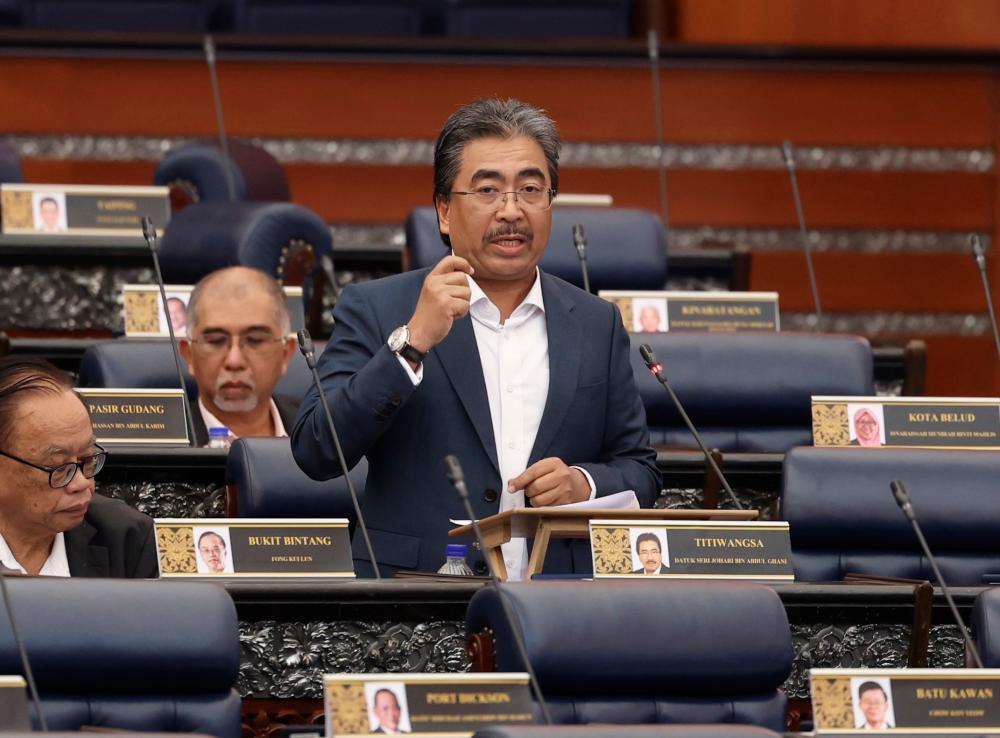KUALA LUMPUR: The European Union’s (EU) ban on the import of palm oil as a biofuel by 2030 is seen as lacking in transparency and scientific reliability which provides an inaccurate view of the sustainability practices practised in the country’s biofuel industry.
Plantation and Commodities Minister Datuk Seri Johari Abdul Ghani said the ban is also seen as biased and will create undue restrictions and contradict free trade practices as it violates the principles of the World Trade Organisation (WTO), namely the Technical Barriers to Trade and the General Agreement on Tariffs and Trade 1994.
He said in this matter, Indonesia and Malaysia have filed complaints with the WTO against the EU’s actions — Indonesia filed its complaint on Dec 9, 2019, and Malaysia filed its complaint on Jan 15, 2021 (about 13 months after Indonesia).
“In my opinion, Malaysia should not have taken such action. This is because the Delegated Act under the Renewable Energy Directive II (RED II) targets palm oil-based biofuels and does not touch on sustainability issues related to palm oil in general,“ he said.
ALSO READ: MPOC: CPO prices set to pull back to RM3,800-4,000 per tonne in April
Johari said this during the Ministerial Question Time in reply to Teresa Kok Suh Sim (PH-Seputeh) who wanted to know whether the WTO’s decision on Malaysia’s appeal regarding the EU’s discrimination against palm oil still allows the union to implement the Delegated Act which bans palm oil as a biofuel by 2030 and whether Malaysia has the expertise to change the EU policy banning palm oil as a biofuel in 2030.
Based on the Delegated Act under the EU RED II, palm oil has been categorised as having a high indirect land-use change (ILUC) rate.
The import of palm oil as a biofuel source by the EU will be fully banned or phased out by 2030 if it is still categorised as having a high ILUC rate.
He said Indonesia is among the world’s leading biofuel producers; PME (palm methyl esters) is a key biofuel blend stock input in Indonesia and Malaysia.
“Based on statistics released by OilWorld, in 2023, an estimated 25.2 per cent (12.2 million tonnes) of Indonesia’s crude palm oil (CPO) production (48.4 million tonnes) was processed to produce PME. In the same period, Malaysia (recorded) only 7.7 per cent (1.4 million tonnes), of which biodiesel constituted 134,000 tonnes.
“Therefore, when the decision was announced, Indonesia took the stand that when it saw Malaysia had also filed this issue with the WTO, it decided to withdraw. They (Indonesia) suspended their case, so now it’s only Malaysia.
“That is why, today, the decision made by the WTO, no one wins. It has 20 issues related to this, 10 won by the EU and 10 won by Malaysia,“ he said.
However, he said many people out there do not understand the issue and it seems as if Malaysian palm oil is worse than Indonesia’s, when in fact Indonesia withdrew their case.
“They (Indonesia) have 12 months from this date to get a decision, but they (Indonesia) let us make the decision first.
“That’s why I think, when we filed then, we should have allowed Indonesia to put in their complaint and we just offer support because they are a big player in the biodiesel industry,“ he said.
Meanwhile, Johari said the Malaysian Sustainable Palm Oil (MSPO) certification standard is better than the Roundtable on Sustainable Palm Oil (RSPO) because MSPO covers a wide spectrum for all oil palm plantations, including smallholders.
“Not only big estates but also smallholders are covered, so what I want to emphasise is that we must carry out engagement, we can’t wait until later to engage.
“I believe that if we engage, all our palm products when they (EU) accept MSPO, it becomes part of the prerequisites for whoever wants to export. Currently, those who ca









